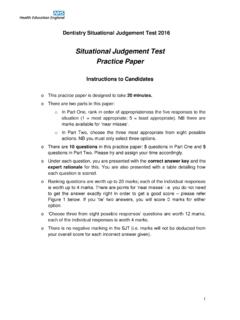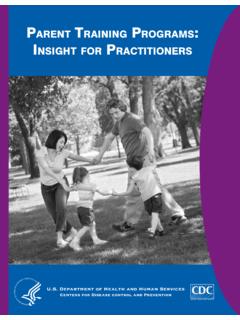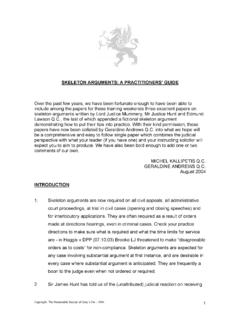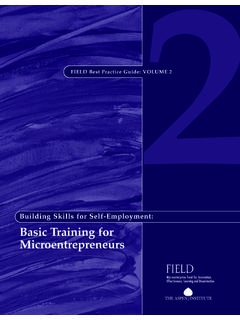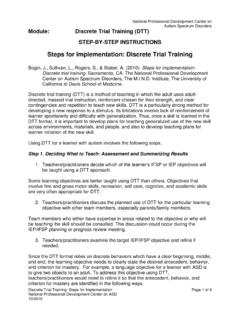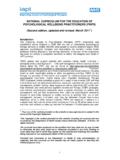Transcription of Dental Foundation Training Curriculum 2015 - …
1 Dental Foundation Training Curriculum2015 Committee of Postgraduate Dental Deans and Directors (COPDEND) UKContentsForeword 3 Context 4 Dental Foundation Training (DFT) 4 DFT Competency Framework Development 5 How to use this document 6 DFT Syllabus and Training 6 Competency Framework 7 Assessment 8 Section I.
2 Competency Framework 9 Overview 10 Clinical Domain 11 Communication Domain 23 Professionalism Domain 26 Management & Leadership Domain 30 Section II. Syllabus and Training 35 Section III.
3 Assessment 41 Reference Documents & Links 42 Steering group membership 432 ForewordThis UK Curriculum describes the knowledge, skills and attributes that are required for a newly qualified dentist to complete a year s pro-gramme of Dental Foundation Training and work independently within NHS primary care; together with guidance about how these competences can be assessed and primary purpose of Dental Foundation Training (DFT) is to ensure that dentists completing the programme have developed into competent, caring, reflective practitioners who can consistently provide safe and e ective care for patients in a primary care on previous versions of the Dental Foundation Training Curriculum .
4 The 2015 version di ers in some significant aspects from the original that was published in 2006 by COPDEND, mostly because the duration of Training has reduced from two years to 12 months, in line with legislative the last ten years there have been continued improvements in the oral health of the UK population, innovative Dental materials and techniques have become mainstream and there is an increased evidence base for what is e ective prevention of disease and promotion of oral education and clinical standards have been published by the General Dental Council and learned professional societies. The system of regulation of Dental practice has also evolved, with involvement of a number of di erent regulators and NHS bodies. This is a UK wide Curriculum that has been agreed by Dental leaders across the four countries, following a comprehensive literature review, wide consultation and extensive piloting.
5 It recognises that the experience of individual trainees can never be identical when Training takes place in numerous di erent Training practice locations. The focus is on learning outcomes and demonstration of competence across the professionalism, communication, management and leadership and clinical domains that underpin all UK undergraduate and postgraduate Dental Training FalconChair of COPDENDP ostgraduate Dental Dean Health Education Thames Valley and WessexMalcolm SmithCOPDEND Lead Dean, Dental Foundation Training Postgraduate Dental Dean, Health Education North EastContextDental Foundation TrainingDFT is defined as a relevant period of employment (fully funded by the NHS) during which a Dental practitioner is employed under a contract of service by an approved Training practice to provide a wide range of Dental care and treatment. In addition, the Dental practitioner is required to attend such study days as that contract requires, with the aims and objectives of enhancing clinical and administrative competence and promoting high standards through relevant postgraduate Training .
6 This includes:DFT aims to prepare Foundation Dentists to be independent practitioners within General Dental Practice, within the context of each of the four UK countries. DFT is not aiming to train a practice owner , or equip Foundation Dentists with the skills required to set up and run a Dental practice, but rather prepare individuals for independent practice as an associate / performer / employee within NHS General or Personal Dental Service relationship of DFT learning outcomes (described in this document within the competency framework) with other periods of Dental Training within the continuum of professional development is indicated in Figure 1. Upon entry to DFT, Foundation Dentists will be registered with the GDC and expected to have already achieved the learning outcomes described in the GDC document Preparing for Practice . The current GDC publication Standards for the Dental Team describes the performance expectations of all UK Dental practitioners, and therefore these apply equally to DFT, and this has been reflected in the revised competency framework.
7 The Department of Health England Advanced Care Pathways for England outline the types of specialised and specialist care / treatment expected of practitioners with di erent levels of expertise. To enable the Dental practitioner to practise and improve their introduce the Dental practitioner to all aspects of Dental practice in primary care; To identify the Dental practitioner s personal strengths and weaknesses and balance them through a planned programme of Training ; To promote oral health of, and quality Dental care for, patients; To develop and implement peer and self-review, and promote awareness of the need for professional education, Training and audit as a continuing process21 With a minority of places within the salaried primary Dental care Excerpt from NHS Dental Performers List Regulations (England).4 Dental Core Training (2/3 years)GDC Preparing for Practice & Postgraduate CurriculaSpecialty Training (3-5 Years)GDC Approved Specialty Training CurriculaDFT (1 year)COPDEND DFT CurriculumDFT Competency Framework DevelopmentIn order to develop a relevant and current competency framework for DFT in the UK, a detailed review of the existing Curriculum was carried out.
8 A wide range of national policy and educational documents were considered, and mapped against the existing DFT competencies in order to identify gaps and/or areas requiring revision. In addition to the GDC publications Preparing for Practice , Standards for the Dental Team and Scope of Practice , the NHS Performers Lists Regulations in Wales and England and the equiva-lent in Northern Ireland have also been considered. Additionally, draft Advanced Care Pathways documents from the Department of Health (England), and standards published by the Care Quality Commission (and UK equivalents) were reviewed. As a result of the mapping exercise, a revised competency framework was produced which was then subject to national consultation with a wide range of stakeholders from the profession. Extensive feedback was received, and following careful consideration by the COPDEND UK Steering Group a number of revisions to the draft document were made, to achieve this final version.
9 The 2015 Curriculum aims to encompass all relevant areas whilst acknowledging the need to be su ciently concise to be a useful, working document for Foundation Dentists and their Educational Supervisors. 3 Following a national consultation exercise involving stakeholders from across the UK, 77 responses were received (24 on behalf of organisation). The report can be read via the COPDEND website 5A syllabus is a summary (list) of the topics that will be covered within a Training course or programme and this is locally competency framework describes the expected outcomes of the Training (upon completion of theprogramme) in terms of knowledge, skills, attitudes and behaviours expected of those undertakingthe Training . Curriculum is an overarching term that describes everything associated with an education or Training programme experience, including the syllabus, teaching methods, assessment and standards (expected outcomes/competencies) and other relevant aspects, for example to Use this DocumentThis Curriculum document contains three sections, describing the syllabus, competency framework and assessment process for DFT.
10 An overview of these elements is described below, with further details in the relevant section. DefinitionsDFT DFT is normally a one year period of Training which combines experiential learning within General Dental Practice, with a minimum of 30 study days targeting specific areas of the Curriculum . These programmes are organised by Postgraduate Dental Deans within Health Education England, NHS Education forScotland, the Wales Deanery, Northern Ireland Medical and Dental Training Agency and The Defence Dental Services. In addition to the experience gained directly through treating patients in practice under supervision, learningalso occurs with the support of Dental Foundation Trainers (Educational and Clinical Supervisors) through identification of individual learning needs, reflection, mentoring, tutorials, workplace-based assessments and high quality compulsory study day programme supplements learning in practice via regular small group teachingsessions, guided peer discussion and problem based learning.
